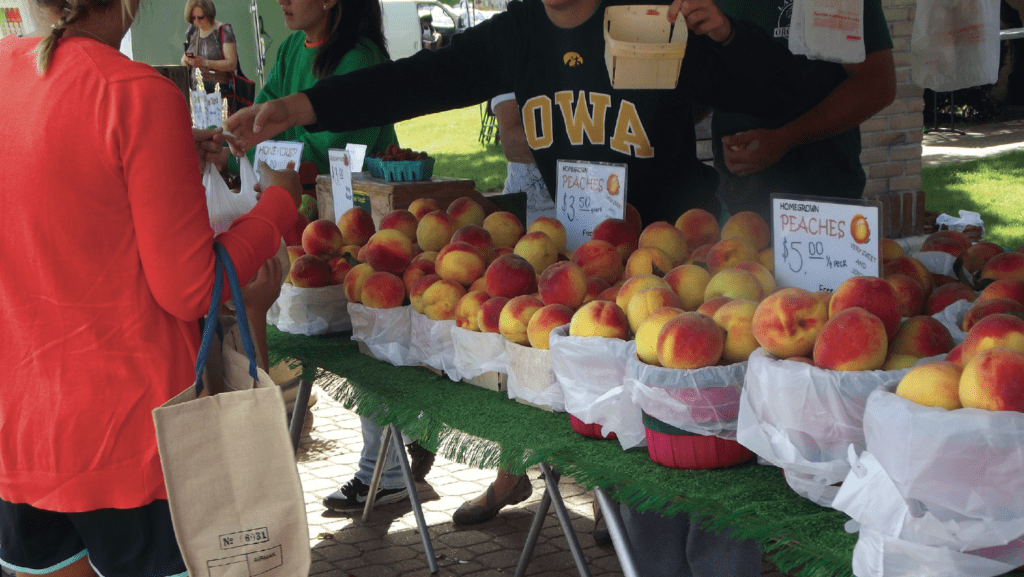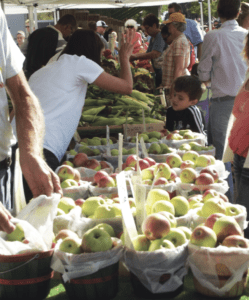

Nov 28, 2018Purdue builds farmers’ market manager skills
Sources of healthy, local produce are important to many community members, especially for those in urban areas and food deserts. Area farmers also need options to market and sell their produce, meats or other goods. Farmers’ markets bring together vendors and consumers. Yet, markets need to be properly managed to comply with food safety guidelines, sustain business and successfully serve the community. Farmers’ markets will fail without proper training and knowledge of new opportunities or challenges. Farmers’ markets in Indiana have varying levels of governance and structure.
Purdue Extension provides professional development training for market managers to offer valuable skill-building education and information to increase market efficacy. One example is a regional, day-long training with information from the USDA and Indiana State Health Department on:
- How to accept SNAP/WIC at markets.
- What can be paid for with SNAP/WIC benefits.
- How to sign up to accept these programs.
Attendees learned about opportunities to improve markets through community partnerships and about food safety concerns. An open discussion with a panel of county health department officials ended the session. Thirty-eight market managers or volunteers representing 12 local markets attended the training.


Another program example is Market Basket 360, a Purdue Extension Issue-Based Action Team project, with two-day workshops, followed by six, two-hour webinars over the next few weeks to cover more topics and to host speakers from around the U.S. The final in-person session was for market managers to present their annual project to improve their market. A total of 36 learning hours, in addition to out-of-classroom project development, were required to complete the certificate. Training topics included role of the market manager, establishing a mission and vision statement, market governance and stakeholders, developing a team to support your market, developing market policies and vendor applications, communication strategies to manage conflict, avoiding market downfalls and planning for success, earning financial support for your market, and collecting and sharing farmers market data.
Other topics focused on grant writing and financial management, Indiana licensing and regulations, developing and using an annual marketing plan, and planning for events, entertainment and emergencies. Twenty market managers from around Indiana attended the training and learned about best practices from professional market managers and Extension.
Attendees in the regional training indicated they gained knowledge on upcoming opportunities, local food bank partnerships and SNAP/WIC acceptance. Eleven markets indicated interest in applying for SNAP/WIC acceptance. Participants appreciated the opportunity to network with other area markets and communicate with local health departments.
A county health department representative indicated this program opened up communication with market masters and vendors, and market managers make contact year round with the department to ensure compliance with code. Fewer violations have been occurring in area markets.
The training also included collecting information for a farmers’ market guide of all markets and stands in a nine-county area. This brochure is updated annually and now includes an interactive map at www.tinyurl.com/2017fmg.
Market Basket 360 attendees (87 percent) reported leaving the program with greater confidence about managing their market, and that their participation in the program will make them a more effective market manager.
Sustainable farmers’ markets have a mission, vision, community support, a board, rules and a manager. Training of market managers can enhance the attendance at market, increasing sales for farmers, and value of the market to the community.
Training of farmers’ market managers and building networks of markets across geographic regions contribute to availability and viability of local foods in urban and rural settings.
For more information, visit www.purdue.edu/dffs/localfood.
– Julie Huetteman, Purdue University
Top photo: Training of market managers can enhance the attendance at market, increasing sales for farmers, and value of the market to the community.














